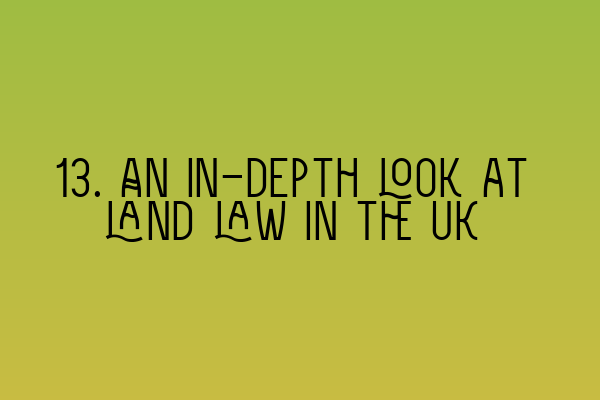13. An In-Depth Look at Land Law in the UK
Welcome to SQE Property Law & Land Law, where we provide expert legal advice and services in the field of land law in the UK. In this blog post, we will take an in-depth look at the intricacies of land law, exploring its various aspects, principles, and regulations.
Understanding Land Law
Land law is an integral part of the legal system in the United Kingdom, governing the ownership, use, and transfer of real property. It encompasses a wide range of legal principles and statutes that aim to regulate the rights and obligations of individuals and entities with respect to land and properties.
Whether you’re buying, selling, or renting a property, understanding land law is crucial to protect your interests and ensure a smooth transaction. At SQE Property Law & Land Law, we are dedicated to providing you with the necessary knowledge and expertise to navigate through the complexities of land law.
Key Principles of Land Law
Land law in the UK is based on a few key principles that form the foundation of the legal framework. Understanding these principles is essential to comprehend the rights and obligations associated with land ownership. Here are some of the key principles:
- Legal Title: Legal title refers to ownership rights recognized by law. It is essential to establish legal title to a property to ensure proper ownership.
- Registered and Unregistered Land: In the UK, land can be registered or unregistered. Registered land is governed by the Land Registration Act 2002 and is subject to registration with the Land Registry. Unregistered land follows the principles set out in common law.
- Estates and Interests: There are various types of estates and interests in land, including freehold, leasehold, and easements. These determine the extent of ownership and the rights associated with the land.
- Contracts and Conveyancing: Contracts play a crucial role in land transactions. Conveyancing is the legal process of transferring ownership from one party to another, ensuring the validity and legality of the transaction.
- Equitable Rights: Equitable rights are principles based on fairness and justice that supplement the legal rights associated with land ownership. They ensure that individuals are treated fairly in their dealings with land and property.
Areas of Land Law
Land law covers various areas that involve rights and issues related to land ownership. Some of the key areas of land law include:
- Co-ownership: Co-ownership deals with situations where multiple individuals or entities own a property together. It establishes the rights and obligations of co-owners and regulates the division and use of the property.
- Leases and Tenancies: Leases and tenancies govern the relationship between landlords and tenants. They set out the terms and conditions of occupancy and define the rights and responsibilities of both parties.
- Mortgages: Mortgages are loans secured against property. Land law sets out the rights and obligations of the borrower (mortgagor) and the lender (mortgagee) and regulates the foreclosure and repossession process.
- Restrictive Covenants: Restrictive covenants are binding conditions on the use and development of land. They are often imposed to maintain the character and value of a particular area.
- Landlord and Tenant Disputes: Land law governs disputes between landlords and tenants, including issues such as rent arrears, eviction proceedings, and breaches of tenancy agreements.
Seek Expert Legal Assistance
Given the complexities and nuances of land law, seeking expert legal assistance is paramount to safeguard your rights and interests. At SQE Property Law & Land Law, we have a team of experienced solicitors specializing in land law.
Whether you are involved in a dispute, need assistance with property transactions, or require guidance on your rights as a landowner, our solicitors are here to provide you with tailored advice and personalized solutions. Contact us today to schedule a consultation.
For further information on related topics, you may find the following articles helpful:
